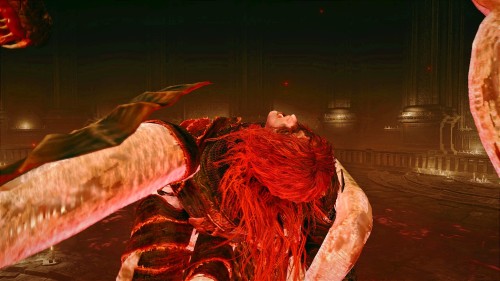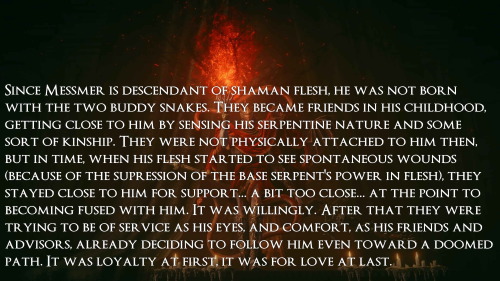Drew My New Profile Picture On Procreate. Still Can’t Figure Out Digital Art, But I’d Say I Did Pretty

Drew my new profile picture on Procreate. Still can’t figure out digital art, but I’d say I did pretty good. Couldn’t make the colored version of the eyes look good, but this looks alright.
Yea. It’s great. Mhm.
More Posts from Itwaskozki and Others


What a stupid ending ...
.

I just felt that I should pay more attention to Messmer in the second phase! Besides, I really like how he's becoming and how his behavior changes from restrained to wild

Yes, I love the way he hissed at us


I had to get hit on the head for this moment


The snake is watching you with its many eyes



I've always wanted to see this animation in more detail


I have to stop looking at Messmer...
How to Write Strong Dialogue
(from a writer of ten years)
So you’re back in the writing trenches. You’re staring at your computer, or your phone, or your tablet, or your journal, and trying not to lose your mind. Because what comes after the first quotation mark? Nothing feels good.
Don’t worry, friend. I’m your friendly tumblr writing guide and I’m here to help you climb out of the pit of writing despair.
I’ve created a character specifically for this exercise. His name is Amos Alejandro III, but for now we’ll just call him Amos. He’s a thirty-something construction worker with a cat who hates him, and he’s just found out he has to go on a quest across the world to save his mother’s diner.
1.) Consider the Attitude and Characteristics of Your Character
One of the biggest struggles writers face when writing dialogue is keeping characters’ dialogue “in-character”.
You’re probably thinking, “but Sparrow, I’m the creator! None of the dialogue I write can be out of character because they’re my original characters!”
WRONG. (I’m hitting the very loud ‘incorrect’ buzzer in your head right now).
Yes, you created your characters. But you created them with specific characteristics and attitudes. For example, Amos lives alone, doesn’t enjoy talking too much, and isn’t a very scholarly person. So he’s probably not going to say something like “I suggest that we pursue the path of least resistance for this upcoming quest.” He’d most likely say, “I mean, I think the easiest route is pretty self-explanatory.”
Another example is a six-year-old girl saying, “Hi, Mr. Ice Cream Man, do you have chocolate sundaes?” instead of “Hewwo, Ice Cweam Man— Chocowate Sundaes?”
Please don’t put ‘w’s in the middle of your dialogue unless you have a very good and very specific reason. I will cry.
Yes, the girl is young, but she’s not going to talk like that. Most children know how to ask questions correctly, and the ‘w’ sound, while sometimes found in a young child’s speech, does not need to be written out. Children are human.
So, consider the attitude, characteristics, and age of your character when writing dialogue!
2.) Break Up Dialogue Length
If I’m reading a novel and I see an entire page of dialogue without any breaks, I’m sobbing. You’re not a 17th century author with endless punctuation. You’re in the 21st century and people don’t read in the same way they used to.
Break up your dialogue. Use long sentences. Use one word. Use commas, use paragraph breaks. Show a character throwing a chair out a window in between sentences.
For example:
“So, you’re telling me the only way to save my Ma’s diner is to travel across five different continents, find the only remaining secret receipt card, and bring it back before she goes out of business? She didn’t have any other copies? Do I have to leave my cat behind?”
vs.
Amos ran a hand over his face. “So, you’re telling me the only way to save my Ma’s diner is to travel across five different continents, find the only remaining secret recipe card, and bring it back before she goes out of business?”
He couldn’t believe his luck. That was sarcastic, of course. This was ironically horrible.
“She didn’t have any other copies?” He leaned forward over the table and frowned. “Do I have to leave my cat behind?”
The second version is easier to digest, and I got to add some fun description of thought and action into the scene! Readers get a taste of Amos’ character in the second scene, whereas in the first scene they only got what felt like a million words of dialogue.
3.) Don’t Overuse Dialogue Tags.
DON’T OVERUSE DIALOGUE TAGS. DON’T. DON’T DON’T DON’T.
If you don’t know what a dialogue tag is, it’s a word after a sentence of dialogue that attributes that dialogue to a specific character.
For example:
“Orange juice and chicken ramen are good,” he said.
‘Said’ functions as the dialogue tag in this sentence.
Dialogue tags are good. You don’t want to completely avoid them. (I used to pride myself on how I could write stories without any dialogue tags. Don’t do that.) Readers need to know who’s speaking. But overusing them, or overusing weird or unique tags, should be avoided.
Examples:
“I’m gonna have to close my diner,” Amos’ mother said.
“Why?” Amos growled. “It’s been in the family forever.”
“I’ve lost the secret recipe card, and I can’t keep the diner open without it!” she cried.
“The Bacon Burger Extreme recipe card?” Amos questioned.
“Yes!” Amos’ mother screamed.
“Well, that’s not good,” Amos complained.
vs.
“I’m gonna have to close my diner,” Amos’ mother said, taking her son’s hand and leading him over to one of the old, grease-stained tabletops with the ripped-fabric booths.
Amos simply stared at her as they moved. “Why? It’s been in the family forever.”
“I’ve—” she looked away for a moment, then took in a breath. “I’ve lost the secret recipe card. And I can’t keep the diner open without it.”
“The Bacon Burger Extreme recipe card?”
“Yes!” She still wouldn’t meet his eyes, and her shoulders were shaking. “Yes.”
Amos sat down heavily in the booth. “Well, that’s not good.”
The first scene only gives character names and dialogue tags. There are no actions and no descriptions. The second scene, however, gives these things. It gives the reader descriptions of the diner, the characters’ actions, and attitudes. Overusing dialogue tags gets boring fast, so add interest into your writing!
So! When you’re writing, consider the attitude of your character, vary dialogue length, and don’t overuse dialogue tags.
Now climb out of the pit of writing despair. Pick up your pen or computer. And write some good dialogue!
Best,
Sparrow

Since Messmer is descendant of shaman flesh, he was not born with the two buddy snakes. They became friends in his childhood, getting close to him by sensing his serpentine nature and some sort of kinship. They were not physically attached to him then, but in time, when his flesh started to see spontaneous wound (because of the suppression of the base serpent’s power in flesh), they stayed close to him for support… a bit too close… at the point to becoming fused with him. It was willingly. After that thy were trying to be of service as his eyes, and comfort, as his friends and advisors, already deciding to follow him even toward a doomed path. It was loyalty at first, It was for love at last.
I don't write Rogier as a total manslut to titillate and be horny on main. I write him that way for one, to be another way he's an opposite to darian, which is just a personal interest of mine lol. But for two, because hypersexuality as a trauma response for him simply made sense to me.
I saw his emotional detachment and general disinterest in bonding with others intimately, and thought 'that guy's got a void in him.' I saw his single minded obsession with his research, and thought 'that guy's gonna fill that void with everything but difficult self-reflection and confrontation of why that void exists to begin with'. It'd be a challenging thing to do even in our modern world of medication and therapy, so I can't imagine him sitting down with someone and talking it out. And he simply doesn't work that way to begin with. When he goes to sleep with Fia, he doesn't break down crying about his own problems. He cries over an unsolved conspiracy that he's obsessed with, because he's not going to puke up his feelings directly. He didn't seek her out for emotional intimacy and healing, because he is much more interested in denying he has much of an emotional state to begin with. Emotional detachment is not 'I feel a bit numb sometimes', or 'I have some angst issues and have trouble talking about my emotional state, but I'd be pleased to help you out with your emotional problems :)' It's alarm bells and dread going off when someone tries to get 'deep' with you. It's your heart rate spiking at the thought of someone confiding intimately in you. It's disgust with your own emotions, if you can even identify them to begin with. It's being asked how you feel and defaulting to a pleasant response and breaking down if someone acknowledges your horrible feelings for you because that is NOT normal. Normal for you is ignoring all of that icky, uncomfortable stuff. Normal for you is laughing nervously and hoping the conversation moves away from talk about everyone's feelings, because you have no idea how to handle that. So if someone is going to bury and deny the emotional, they're going to seek the comforts and outlets for feelings that would normally come from such intimacy via other means. They're poor substitutes, but they don't come with that anxiety over trying to grapple with something you simply do not and never have had the mental capacity to deal with. You get the dopamine hits and relief from stress using these purely physical indulgences. Good food, booze, casual sex, whatever works, because without it that void in you where intimate connections and healthy introspection should be yawns, and yawns, and yawns, until you're sure it's going to swallow you whole. Better fill it with something, or there's not going to be much of you left that isn't a miserable husk.

When Charles first joined the gang.
Everybody just annoyed of Sean's incessant rambling about Ireland.
we broke his ai and he wouldn’t die

For all you Messmer writers/artists fighting with his Shakespearean speech: this guide is straightforward and has multiple parts if you click around. Here’s a small chart with terms of address, examples of word order/basic questions, and some verbs.
Here’s a simple explanation of “-eth” and “-est” verb endings.
Ranni and several other characters also speak this way or in a similar fashion. Something to note is that “you” was used by lower-ranking people to address those of a higher rank/status, and “thou/thee” by higher-ranking people to address those of a lower rank/status. Alternatively, nobles used “you” amongst themselves, which adds some flavor to dialogue.
A lot of Shakespearean dialogue is meant to showcase how performative and ridiculous the nobility or upper-classes were during his time (and still is nothing changed lmao). There are tons of Shakespearean dictionaries as well; a lot of words we use today meant something entirely different then, or had different contextual interpretations. It’s meant to sound flowery and has a particular cadence that I recommend listening to as well. Find a good reading on YouTube and really listen to how the words fit against each other. No, you don’t have to write in metered verse (sweats in iambic pentameter) or rhymed prose, but it helps develop dialogue that flows and feels more natural when you can imagine how it sounds as you write.
Here’s a glossary. Have fun with it, don’t let it roll you. Weak foe ahead.

